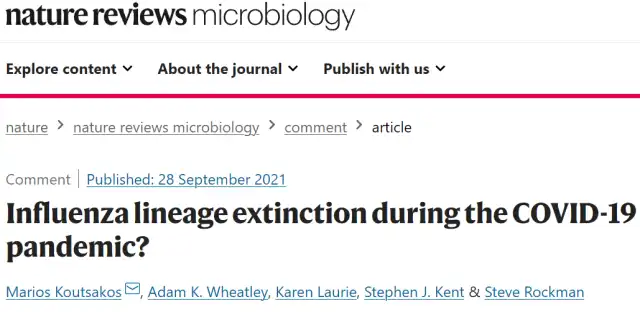No Such Influenza Strain Detected Globally in Almost 3 Years
- Normal Liver Cells Found to Promote Cancer Metastasis to the Liver
- Nearly 80% Complete Remission: Breakthrough in ADC Anti-Tumor Treatment
- Vaccination Against Common Diseases May Prevent Dementia!
- New Alzheimer’s Disease (AD) Diagnosis and Staging Criteria
- Breakthrough in Alzheimer’s Disease: New Nasal Spray Halts Cognitive Decline by Targeting Toxic Protein
- Can the Tap Water at the Paris Olympics be Drunk Directly?
No Such Influenza Strain Detected Globally in Almost 3 Years Due to COVID-19 Control Measures
- Should China be held legally responsible for the US’s $18 trillion COVID losses?
- CT Radiation Exposure Linked to Blood Cancer in Children and Adolescents
- FDA has mandated a top-level black box warning for all marketed CAR-T therapies
- Can people with high blood pressure eat peanuts?
- What is the difference between dopamine and dobutamine?
- How long can the patient live after heart stent surgery?
No Such Influenza Strain Detected Globally in Almost 3 Years Due to COVID-19 Control Measures.
Influenza, commonly known as the flu, is an acute respiratory infectious disease caused by influenza viruses. It has a rapid onset and is highly contagious.
However, during the global efforts to control the COVID-19 pandemic, an unexpected outcome regarding the flu emerged: the B/Yamagata lineage, one of the four major flu lineages, disappeared from the human influenza surveillance network following the emergence of the novel coronavirus.
On September 23, 2023, the World Health Organization released a Q&A on the “Recommendation of Components for the 2024 Southern Hemisphere Influenza Season’s Influenza Virus Vaccines and Development of Candidate Influenza Vaccines for Pandemic Response.”
Regarding the question of whether the BY lineage antigen should continue to be included in the vaccines, the World Health Organization provided the following response:
Since March 2020, the WHO Collaborating Centers for Influenza have not detected naturally occurring B/Yamagata influenza viruses. Recent reports of B/Yamagata viruses that have been sporadically detected cannot be confirmed as naturally occurring B/Yamagata influenza viruses. B/Yamagata viruses are unlikely to be circulating in the population. Therefore, the WHO Influenza Vaccine Composition Committee considers it unnecessary to include B/Yamagata lineage antigens in influenza vaccines any longer.
On October 5, 2023, a committee of vaccine experts known as the Vaccines and Related Biological Products Advisory Committee (VRBPAC) voted unanimously to exclude the B/Yamagata lineage influenza virus from future influenza vaccines.
So, what led to this change? A commentary article titled “Impact of COVID-19 outbreaks and interventions on influenza in China and the United States” published in Nature Subjournal in September of this year suggests that the disappearance of the B/Yamagata lineage is largely associated with the COVID-19 pandemic control measures.

First, let’s understand the influenza viruses. Influenza viruses belong to the Orthomyxoviridae family and are single-stranded, negative-sense, segmented RNA viruses. They are categorized into four types: Influenza A, B, C, and D (or A, B, C, D).
Influenza A viruses can be further classified into various subtypes based on the protein structures and genetic characteristics of their hemagglutinin (HA) and neuraminidase (NA) proteins. Currently, there are 18 HA subtypes (H1-18) and 11 NA subtypes (N1-11). Influenza A viruses infect a wide range of hosts, including humans, birds, pigs, horses, seals, whales, minks, and more.
Influenza B viruses are classified into two lineages: Victoria and Yamagata. In previous flu seasons, these lineages alternated or co-circulated in human populations. However, since March 2020, there have been very few reports of naturally occurring B/Yamagata lineage influenza viruses globally. The viruses causing seasonal flu outbreaks primarily belong to the H1N1 and H3N2 subtypes of influenza A and the Victoria lineage of influenza B.
Influenza C viruses can infect humans, dogs, and pigs but typically cause sporadic cases of upper respiratory infections.
Influenza D viruses mainly infect pigs and cattle, with no reported human infections to date.
Therefore, Influenza A and B viruses are the main focus of human surveillance.
As mentioned in the Nature Subjournal article, from April 2020 to August 2021, no B/Yamagata lineage influenza virus strains were isolated globally. This suggests that this lineage may have become extinct. The disappearance of the B/Yamagata lineage is largely attributed to COVID-19 control measures, especially changes in lifestyle, mask-wearing, increased social distancing, and travel restrictions. These measures have been effective in reducing the incidence of respiratory infections.
What impact does the disappearance of the B/Yamagata lineage have on vaccine administration? The latest recommendation from WHO for the Southern Hemisphere trivalent vaccine includes H3N2, A(H1N1), and B/Victoria components but excludes the B/Yamagata lineage. However, as a precautionary measure, WHO continues to provide recommendations for quadrivalent influenza vaccines this year.
The specific influenza virus strain recommendations are as follows:
Influenza vaccine strainS recommended by WHO
2023 Recommended strains for Southern Hemisphere
Recommended strains of quadrivalent chicken embryo influenza vaccine
- an A/Sydney/5/2021(H1N1)pdm09-like virus:
- a B/Austria/1359417/2021and(B/Victoria lineage)-like virus;
- a B/Austria/1359417/2021 (B/Victoria.aB/Phuket/3073/2013(B/Yamagata lineage)-like virus.lineage)-like virus.
- a B/Phuket/3073/2013 virus(B/Yamagata type)-like virus.
Recommended strains of trivalent embryonated chicken influenza vaccine
- an A/Darwin/9/2021(H3N2)-likevirus;
- an A/Darwin/9/2021(H3N2)-like virus;
- a B/Austria/1359417/2021 virus(B/Victoria pedigree)-like virus
2023 Recommended strains for Northern Hemisphere
Recommended strains of quadrivalent chicken embryo influenza vaccine
- an A/Victoria/4897/2022(H1N1)pdm09 virus
- an A/Darwin/9/2021(H3N2) virus
- a B/Austria/1359417/2021 virus(B/Victoria pedigree)
- aB/Phuket/3073/2013 virus(B/Yamagata type)
Recommended strains of trivalent embryonated chicken influenza vaccine
- an A/Victoria/4897/2022(H1N1)pdm09 virus
- an A/Darwin/9/2021(H3N2) virus
- aB/Austria/1359417/2021 virus(B/Victoria pedigree)
No Such Influenza Strain Detected Globally in Almost 3 Years Due to COVID-19 Control Measures
Disclaimer of medicaltrend.org
Important Note: The information provided is for informational purposes only and should not be considered as medical advice.



